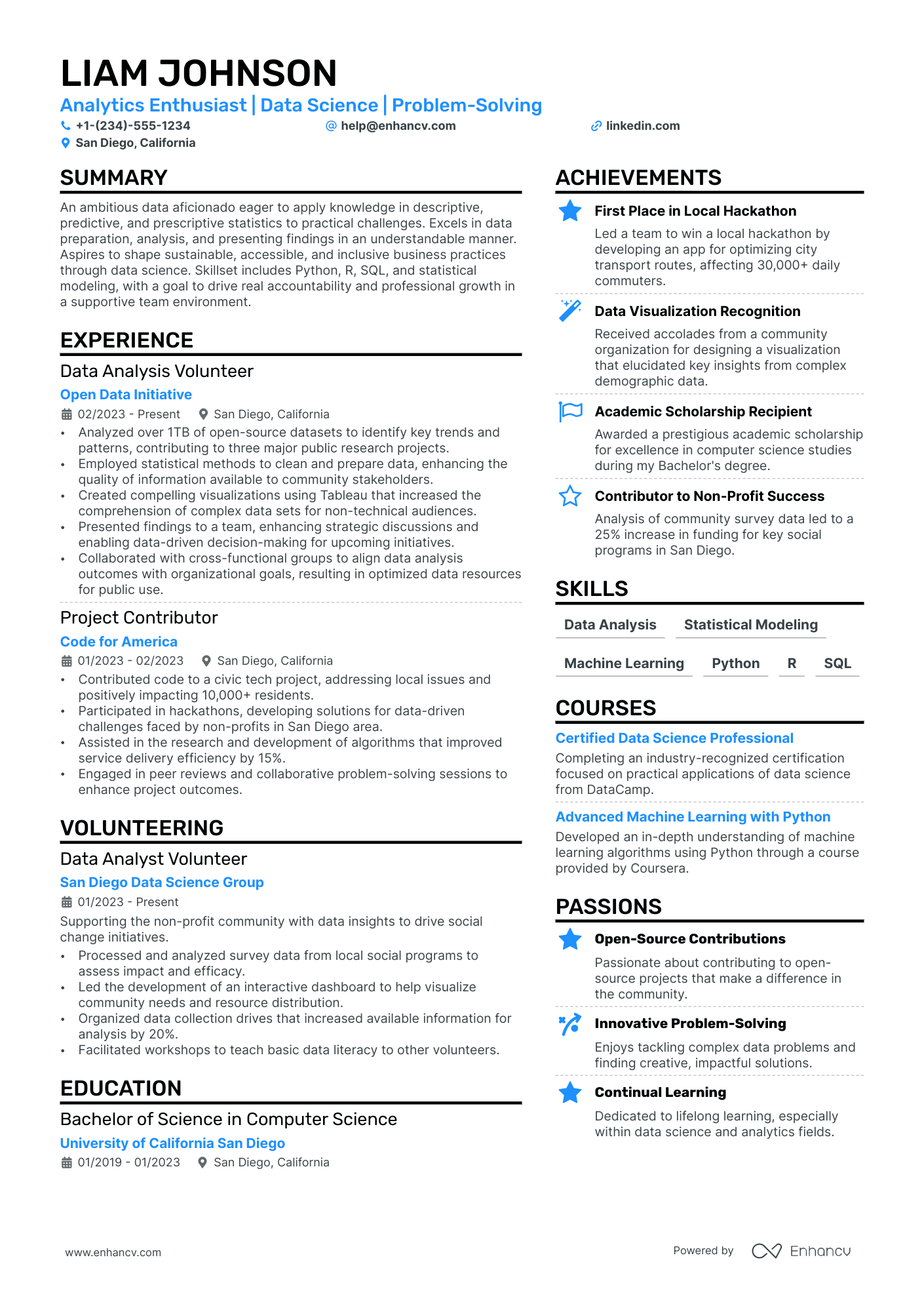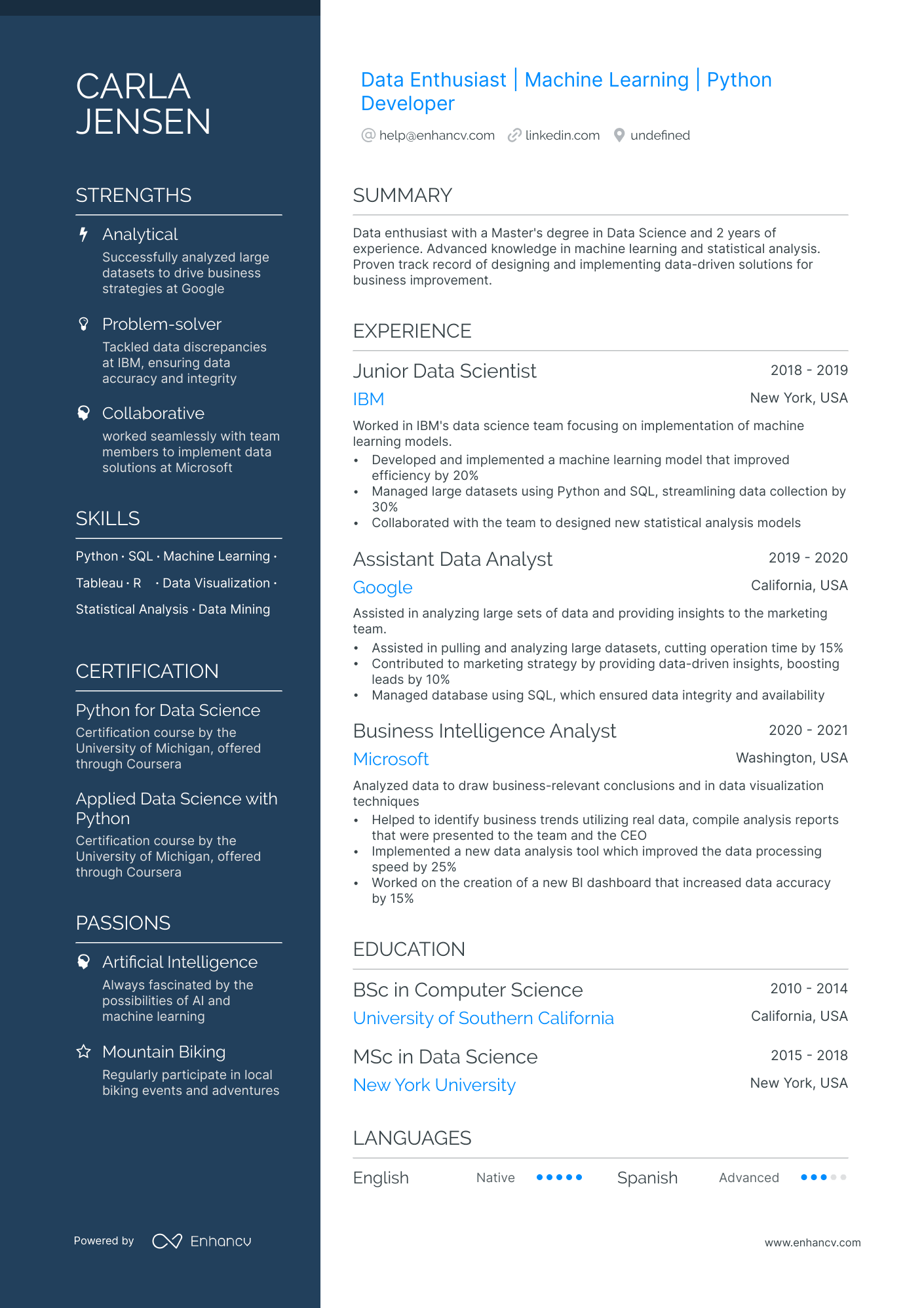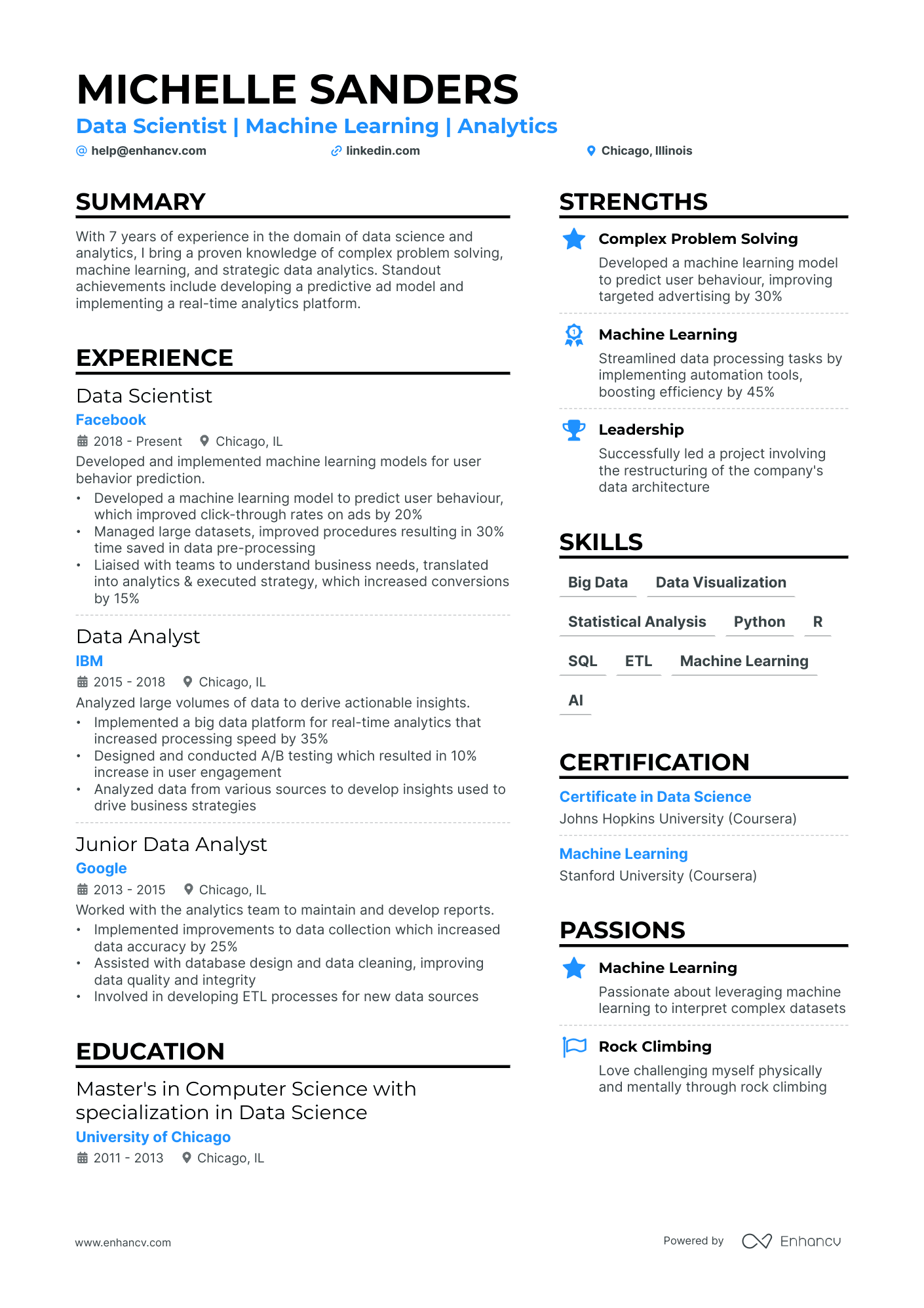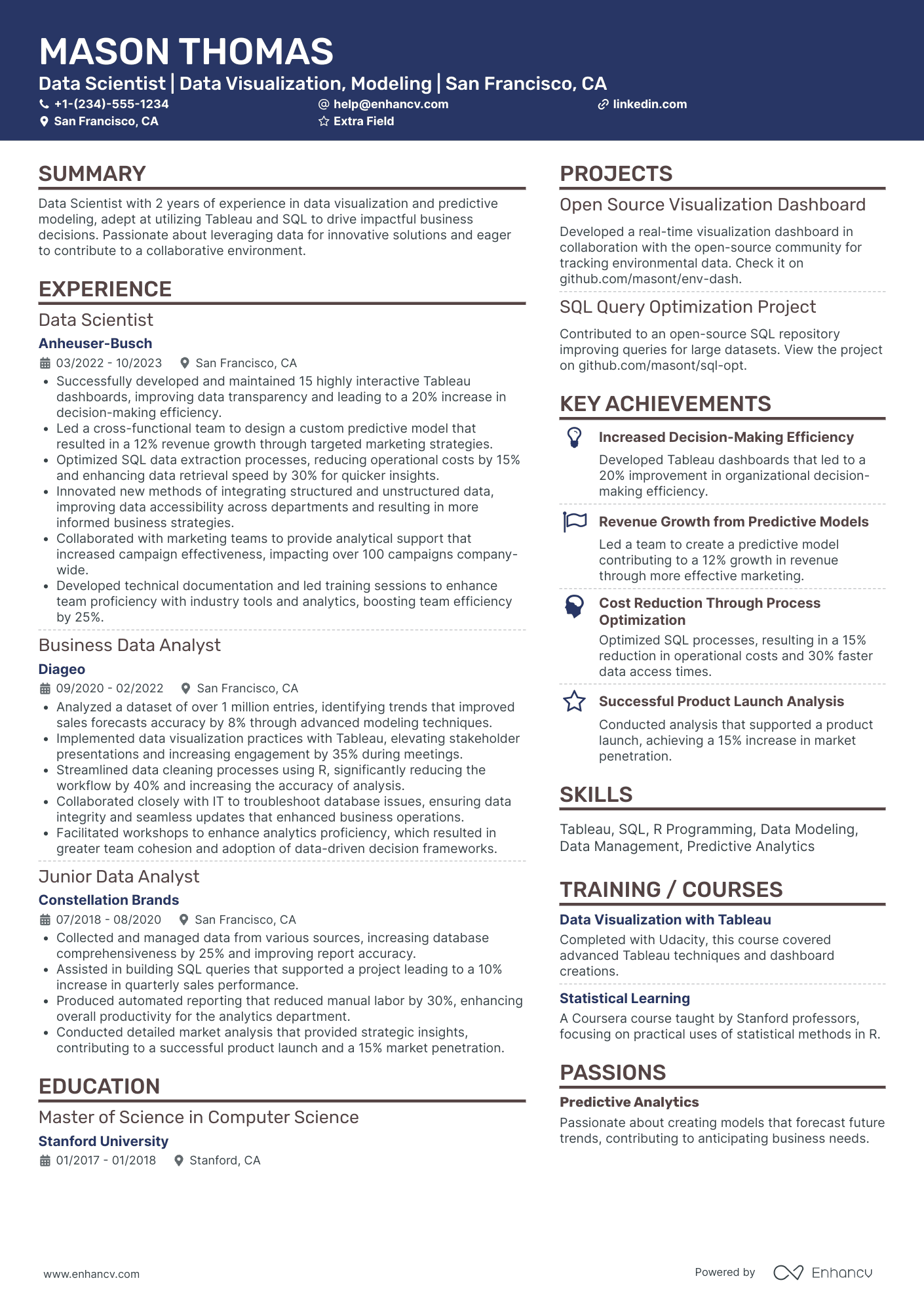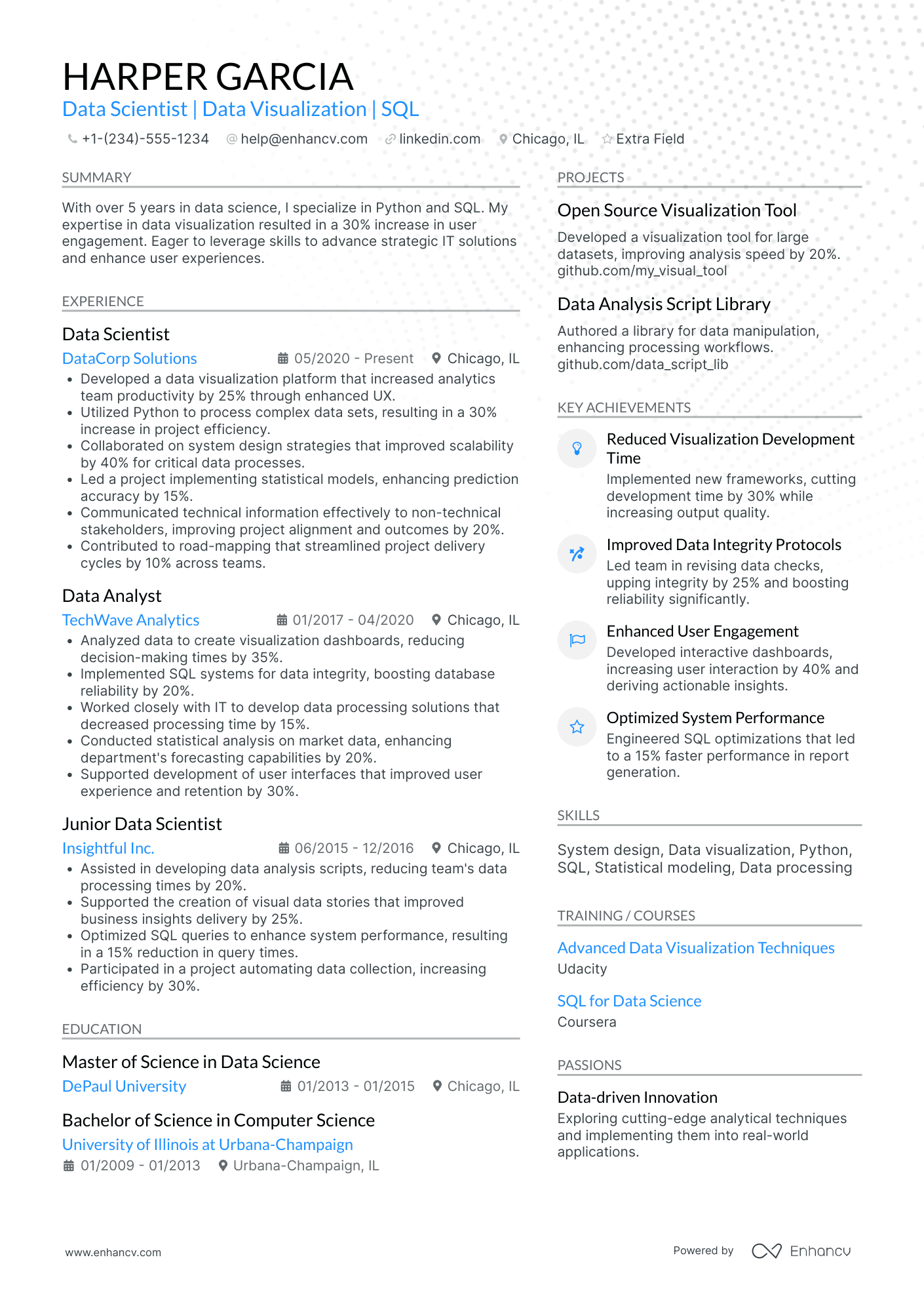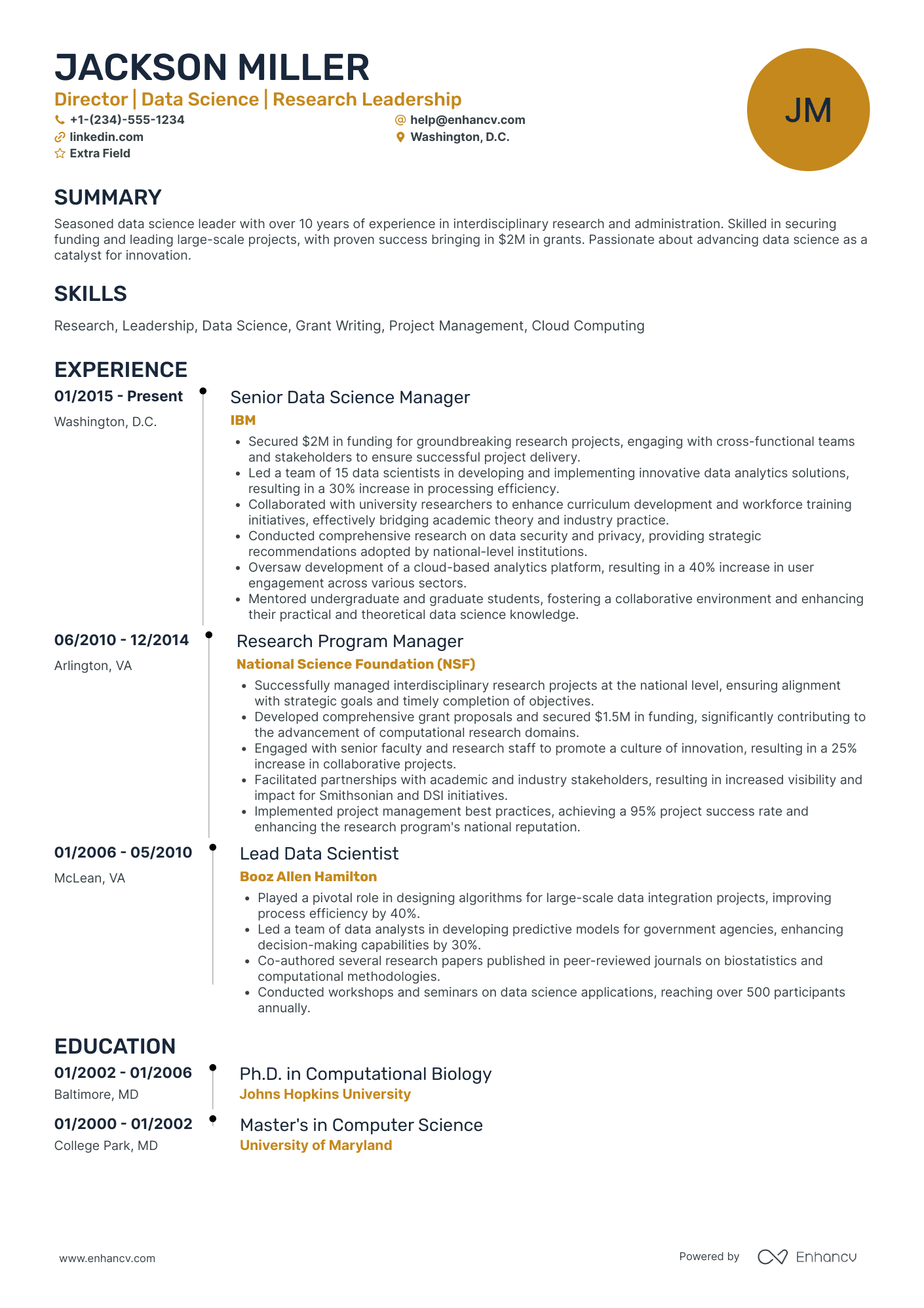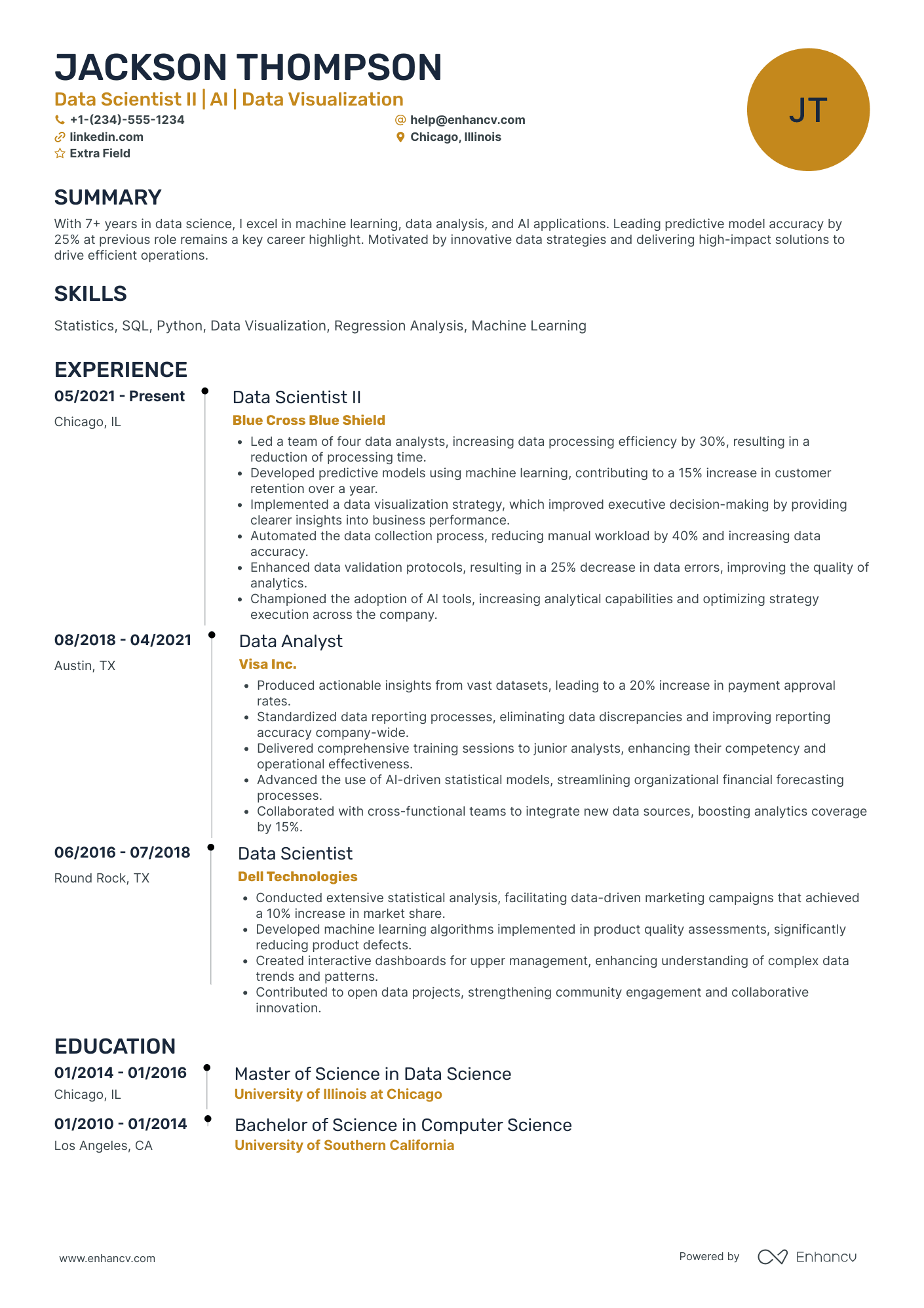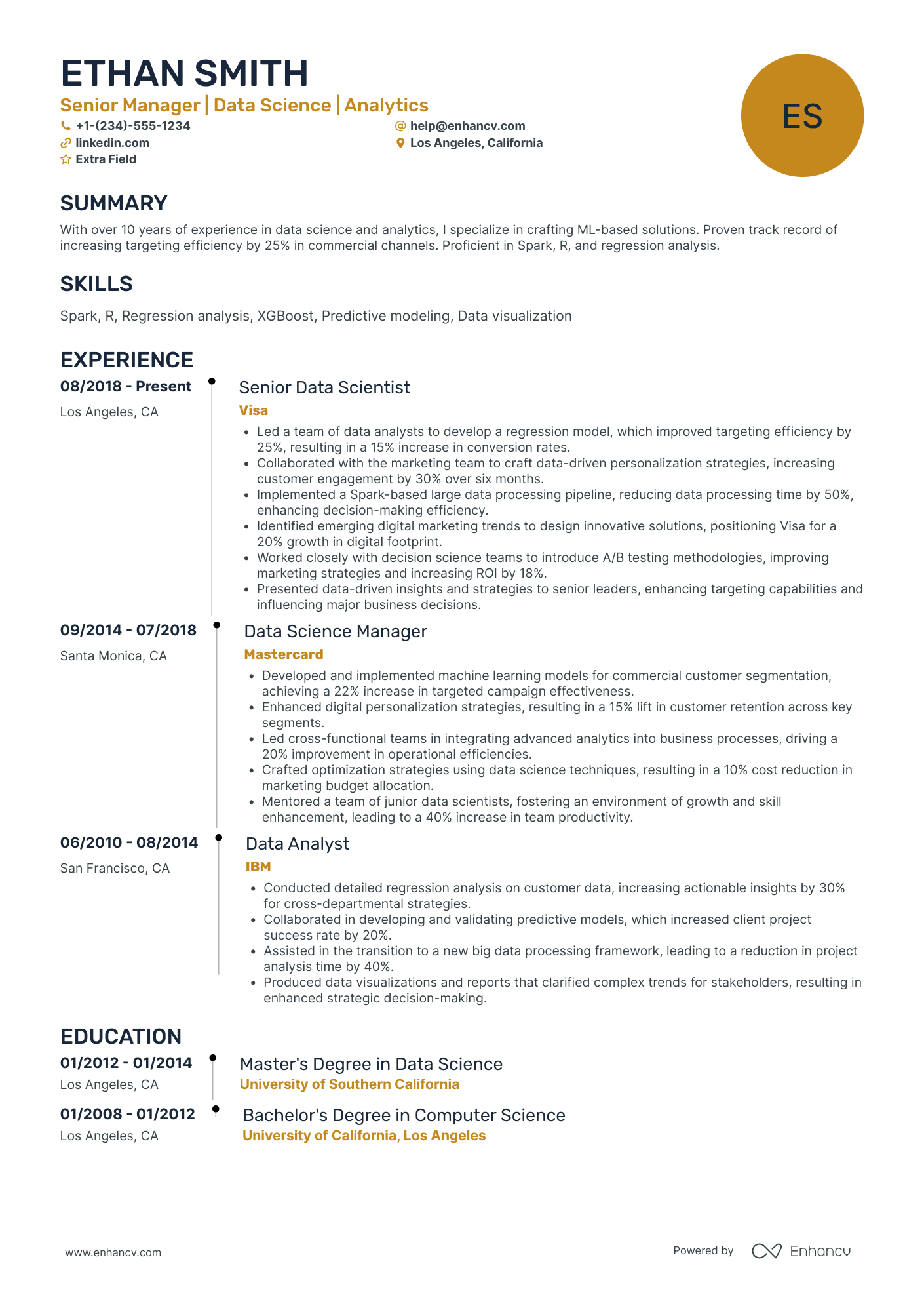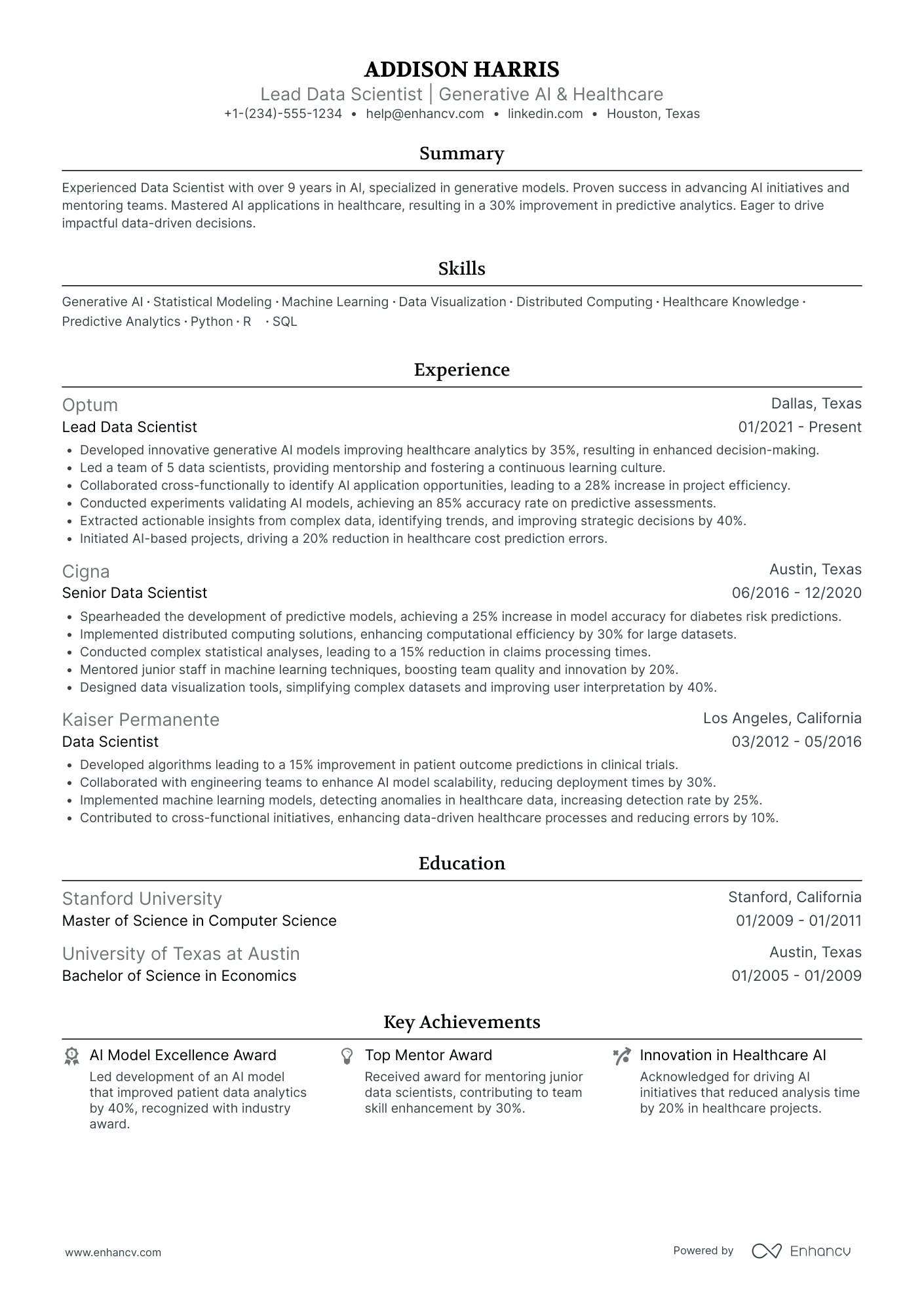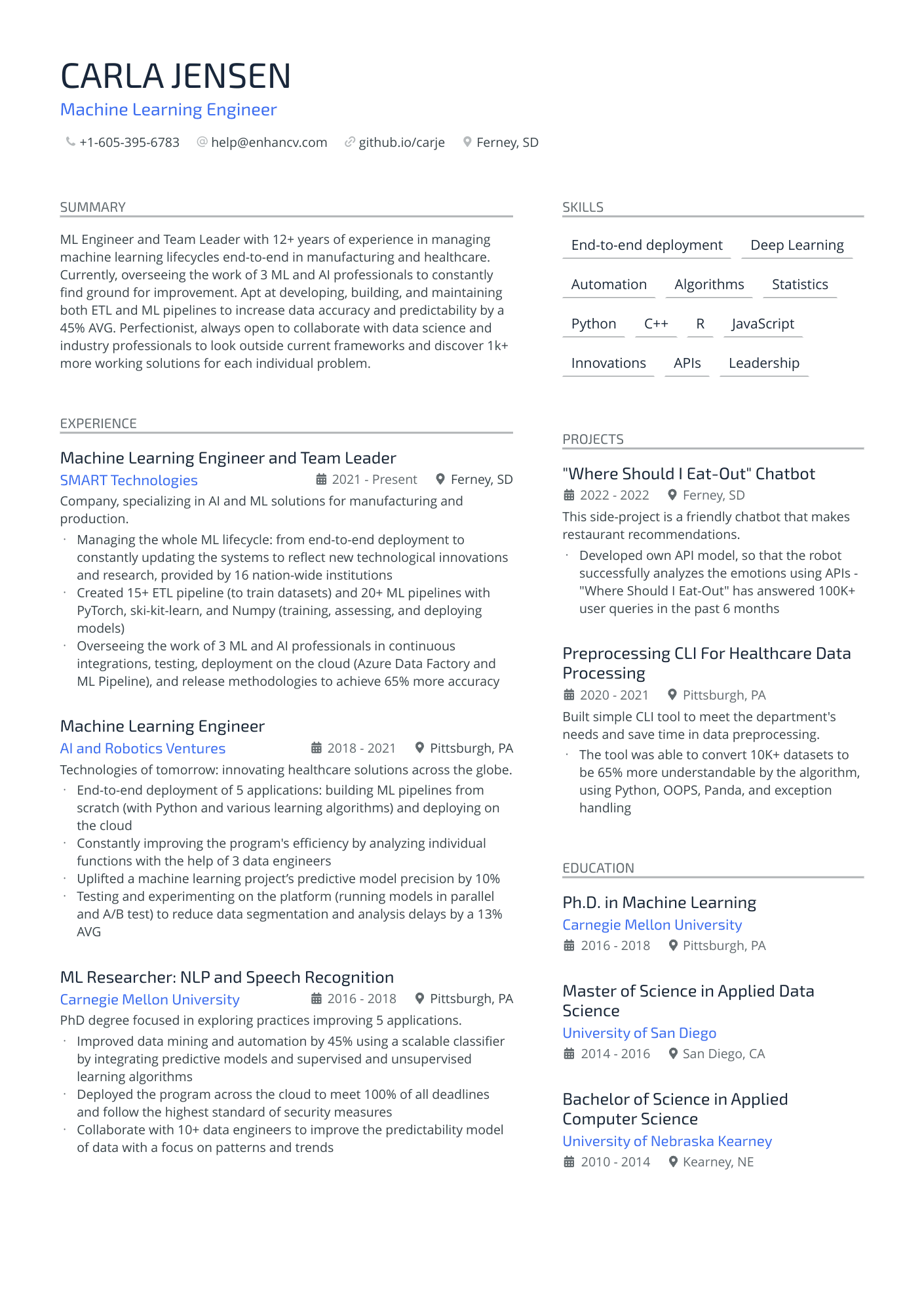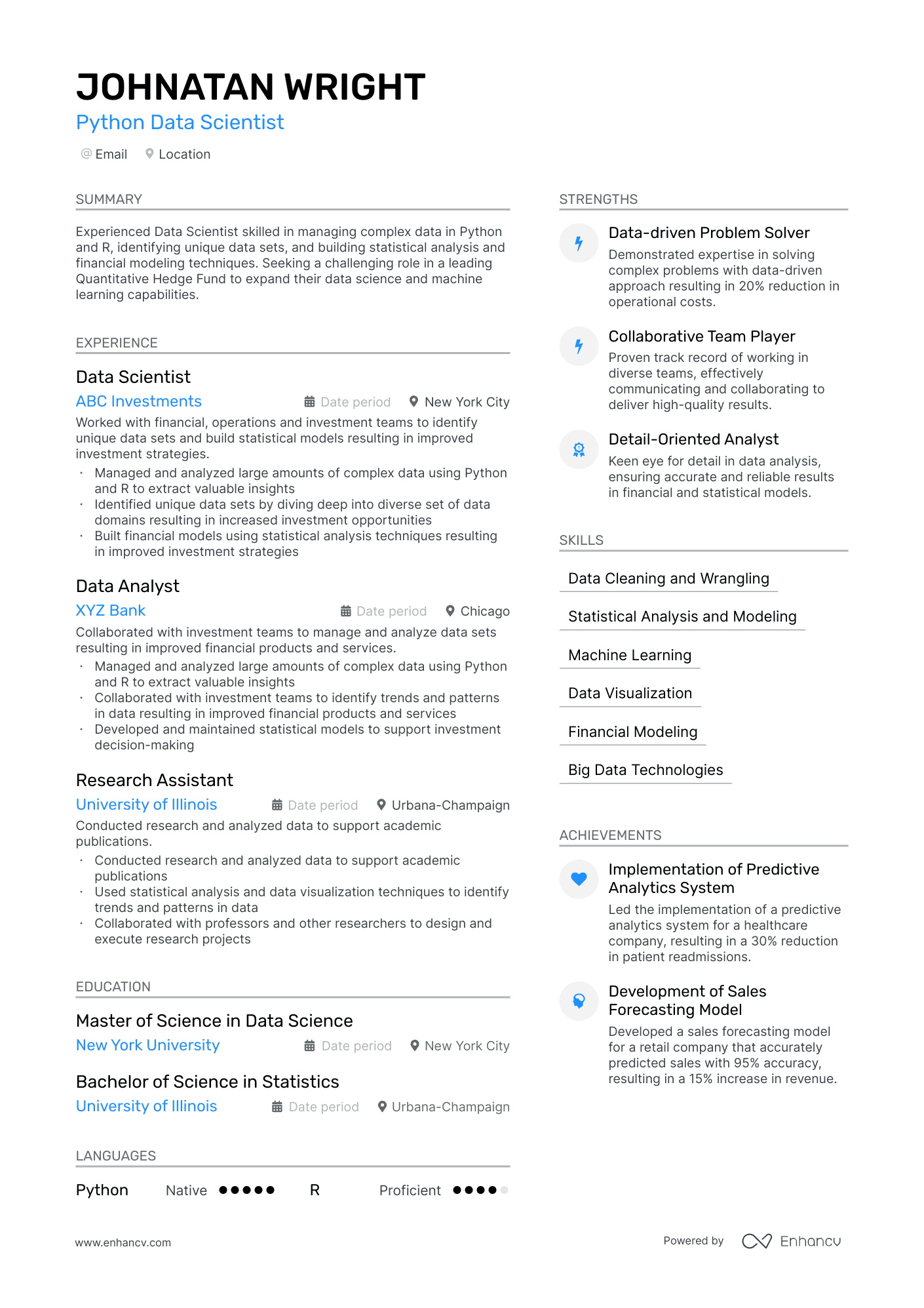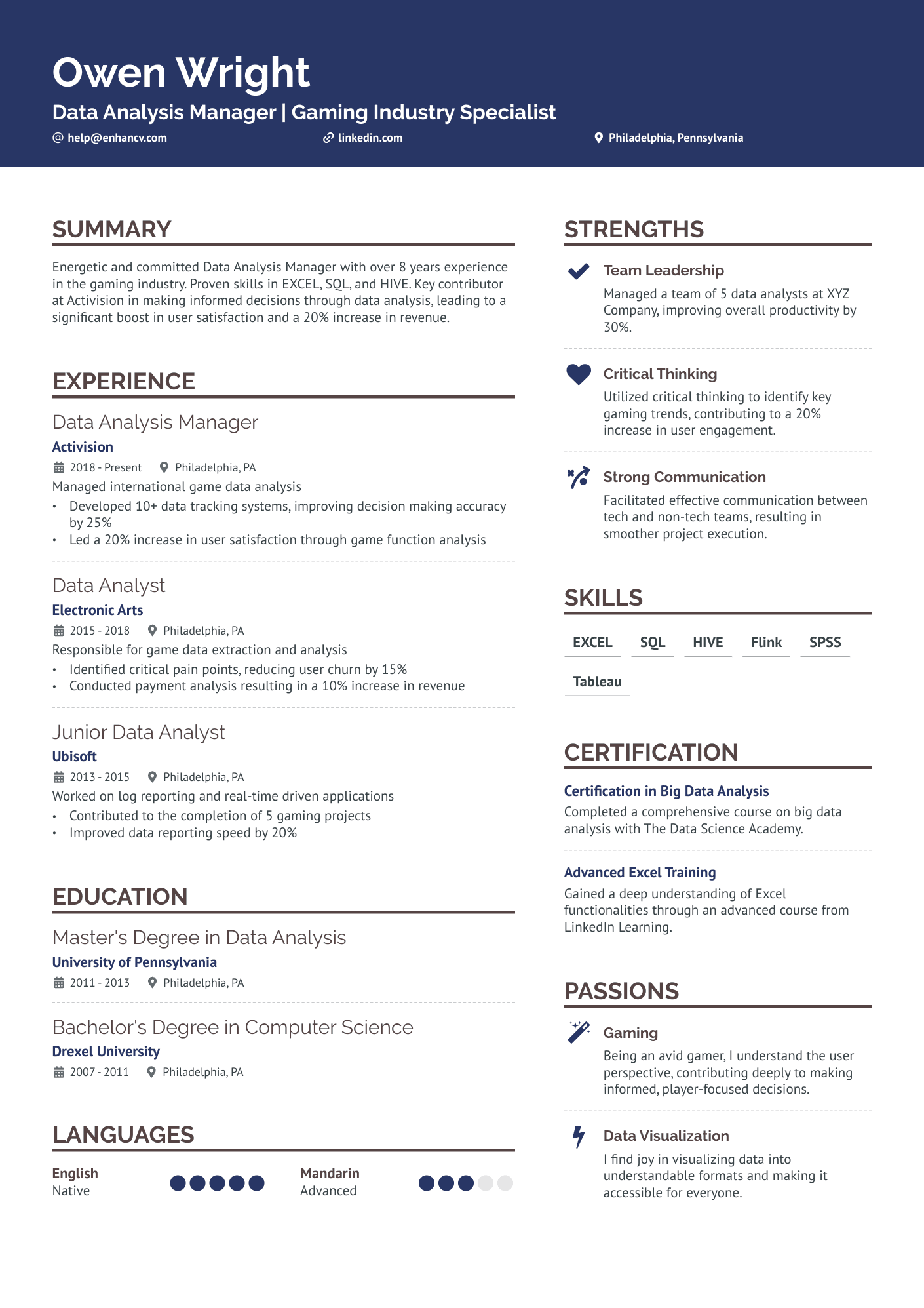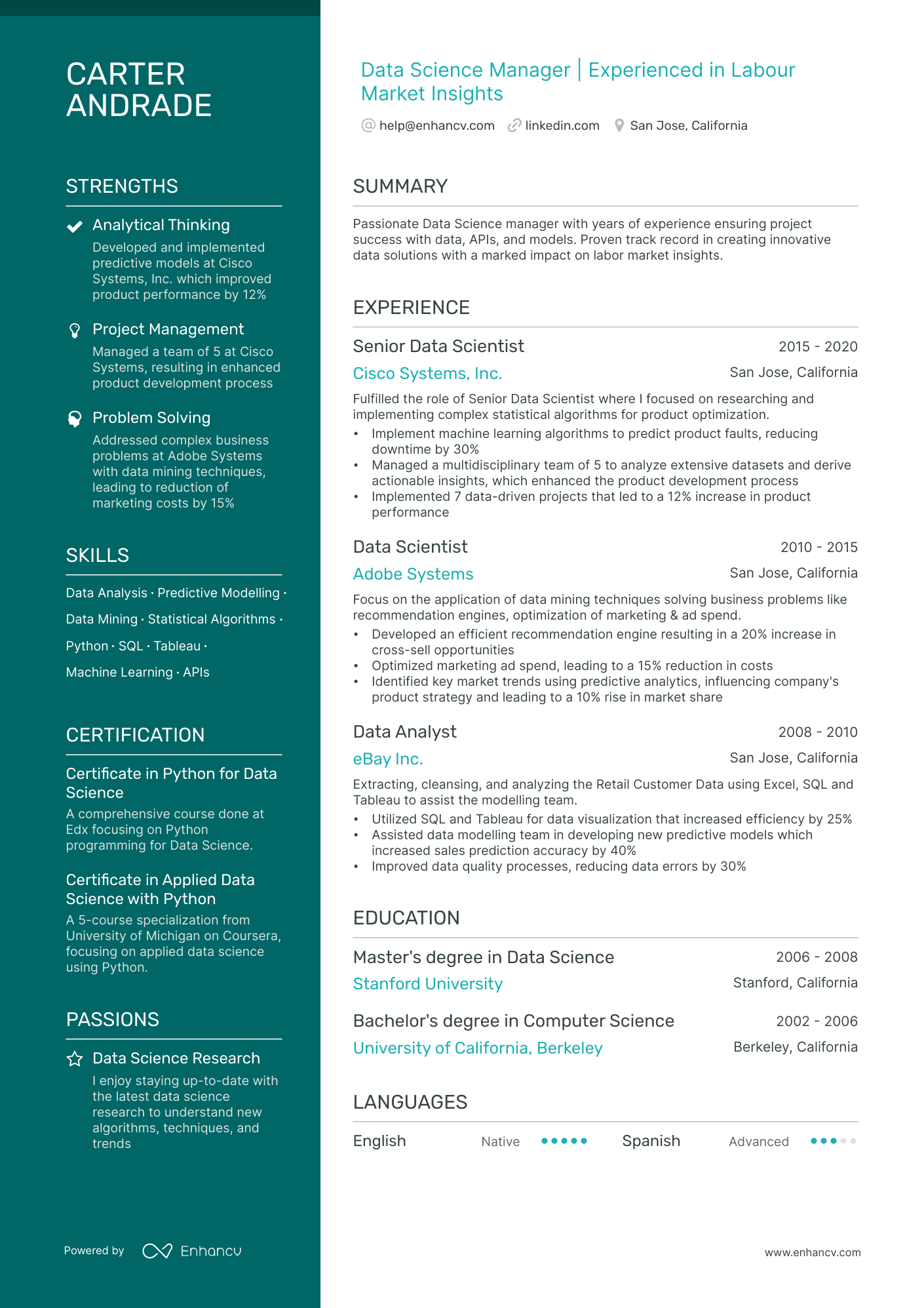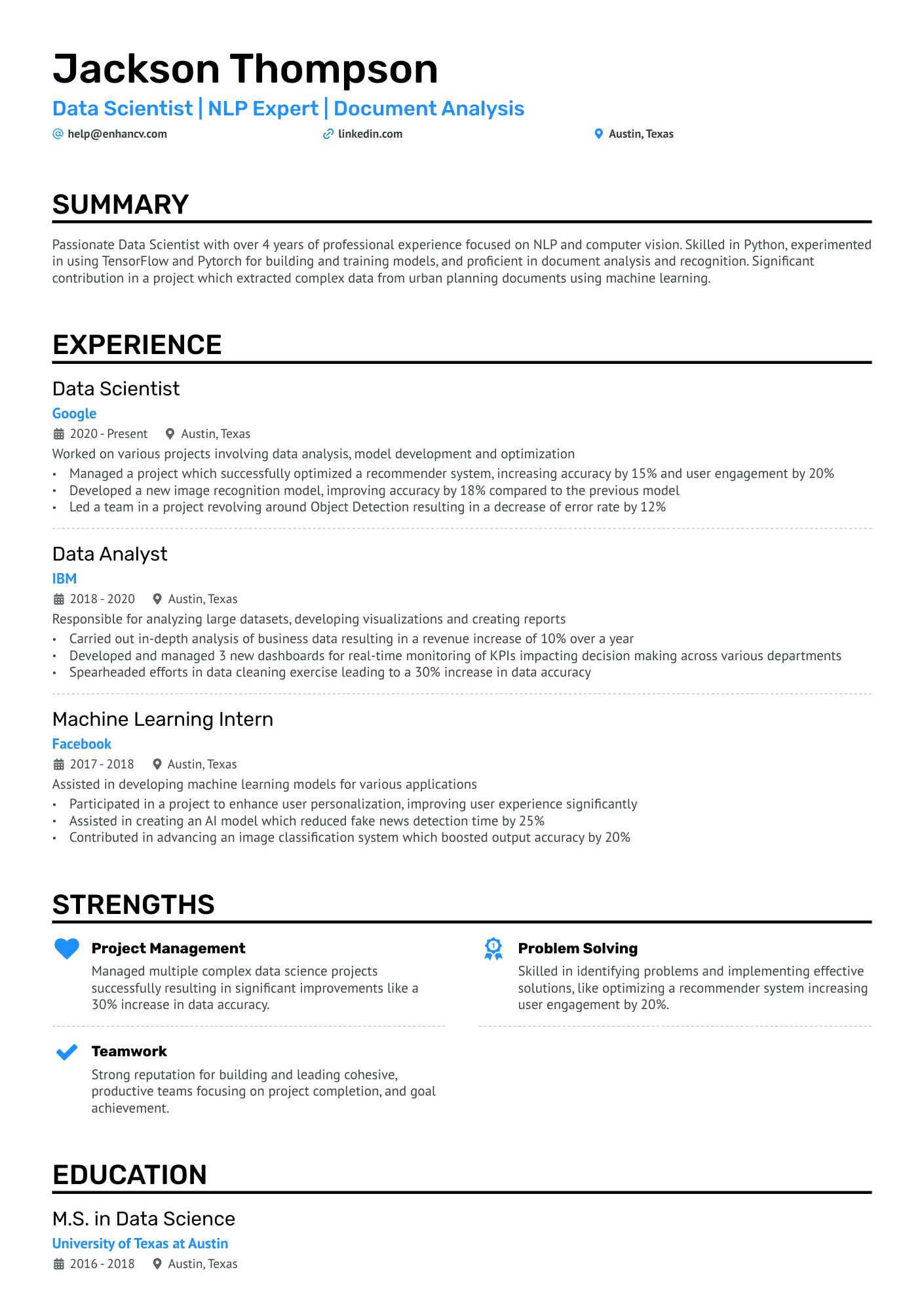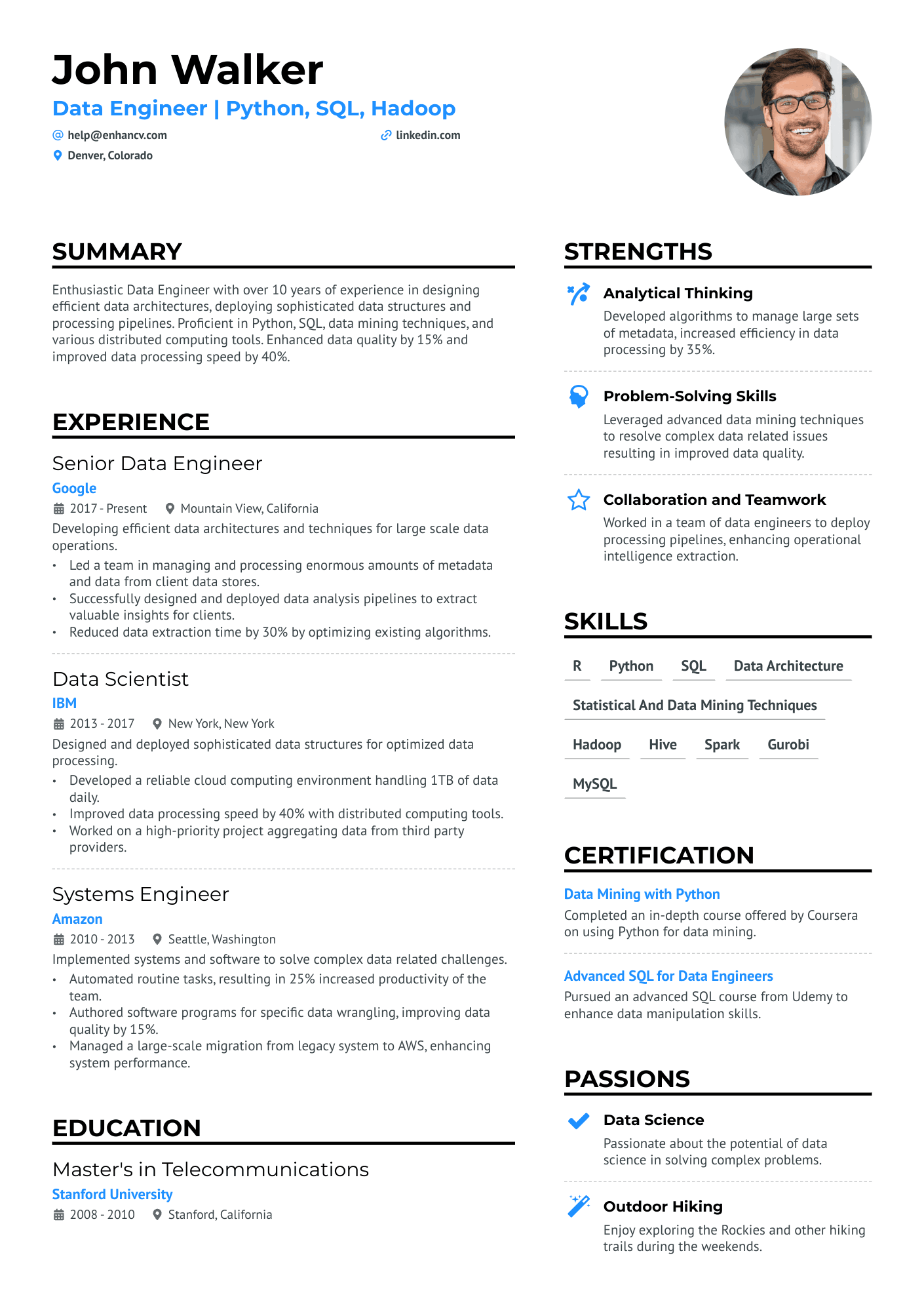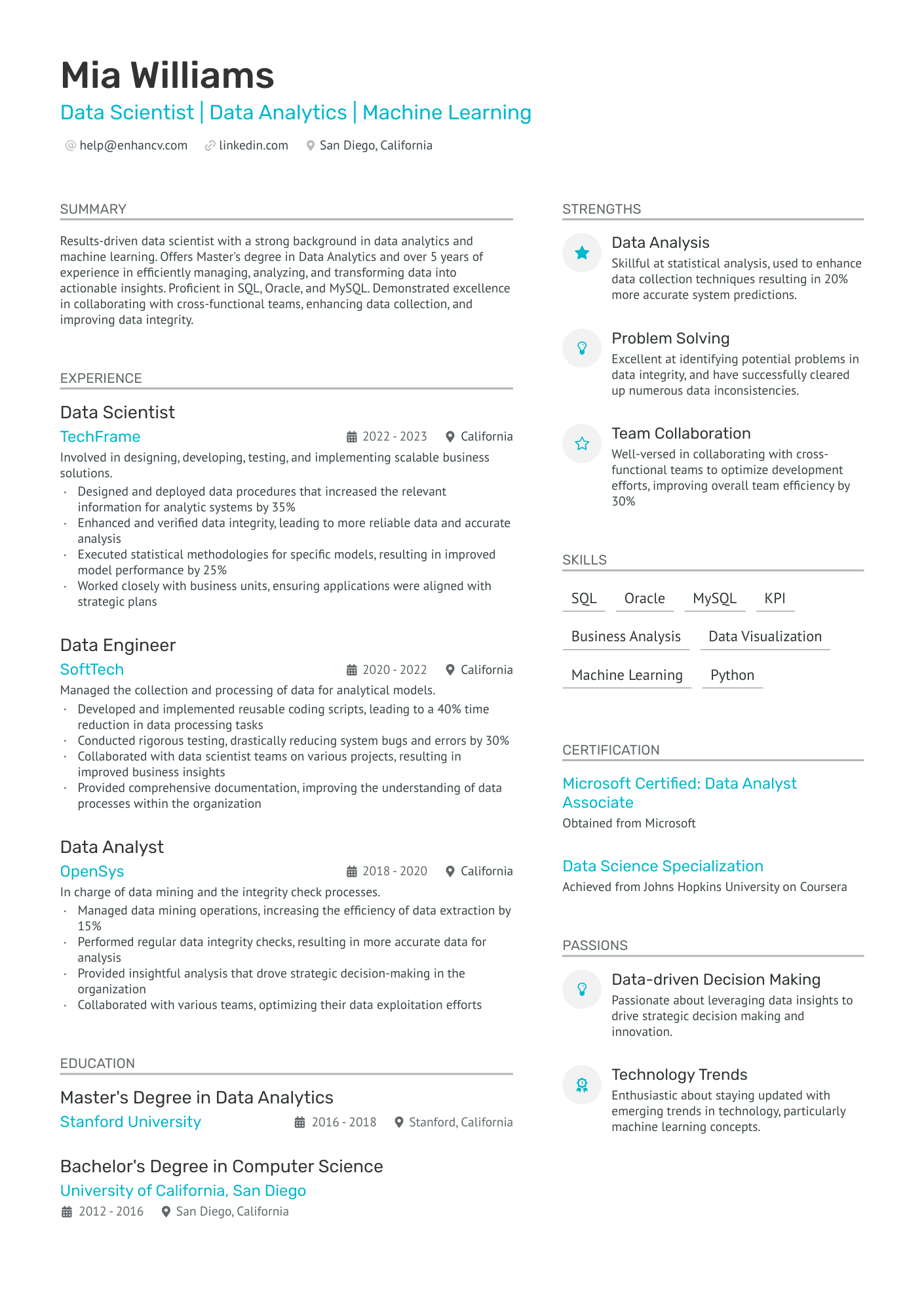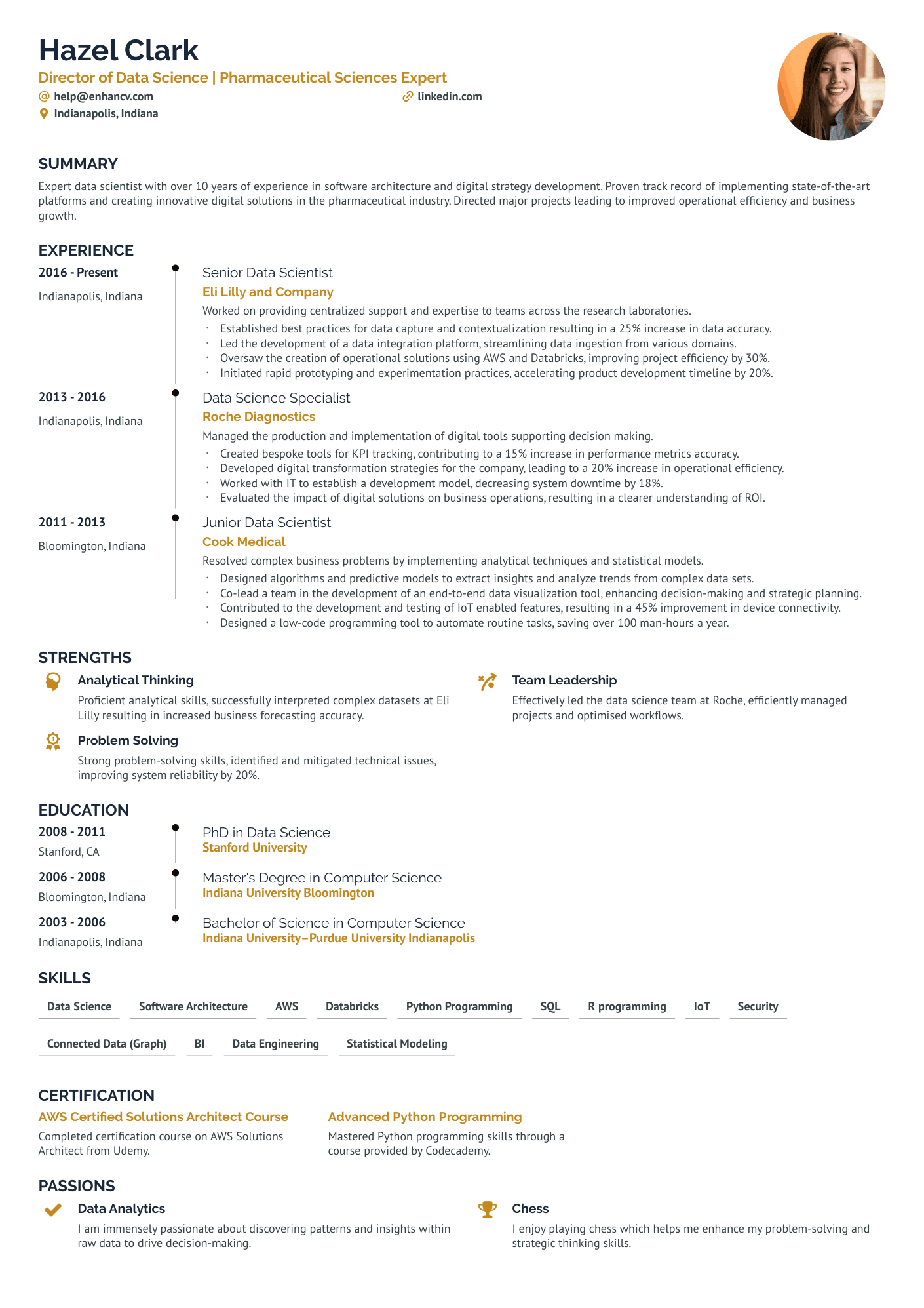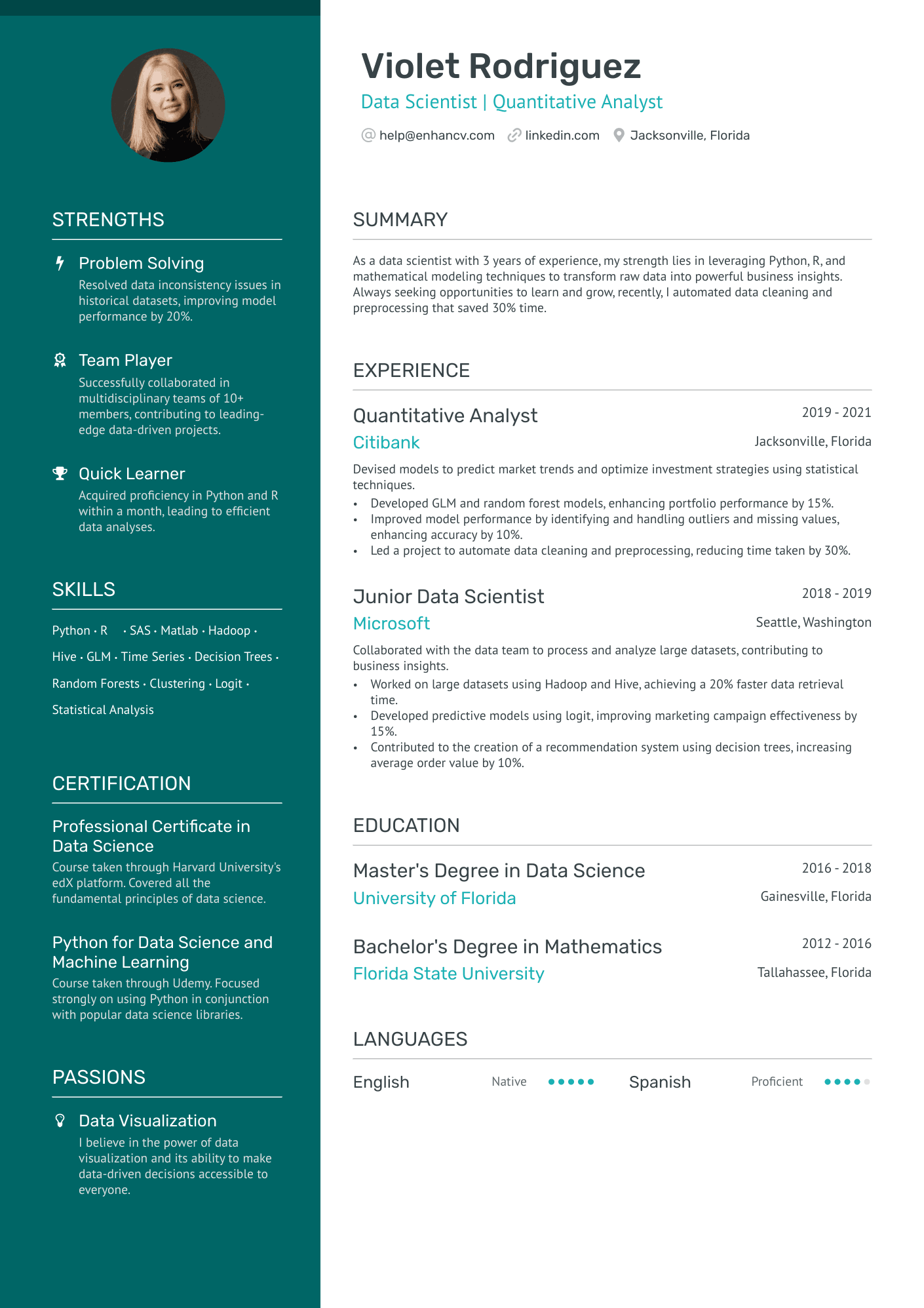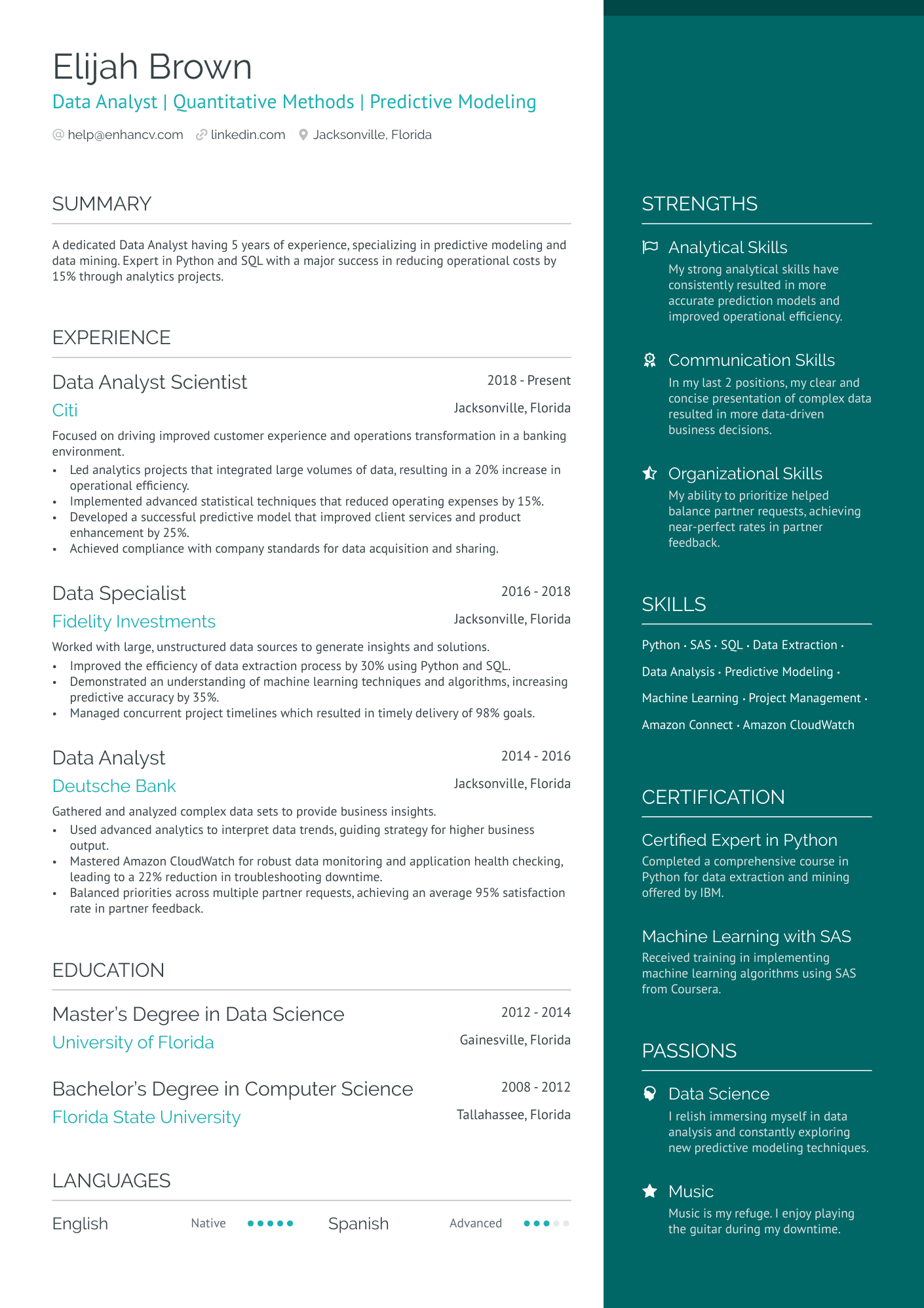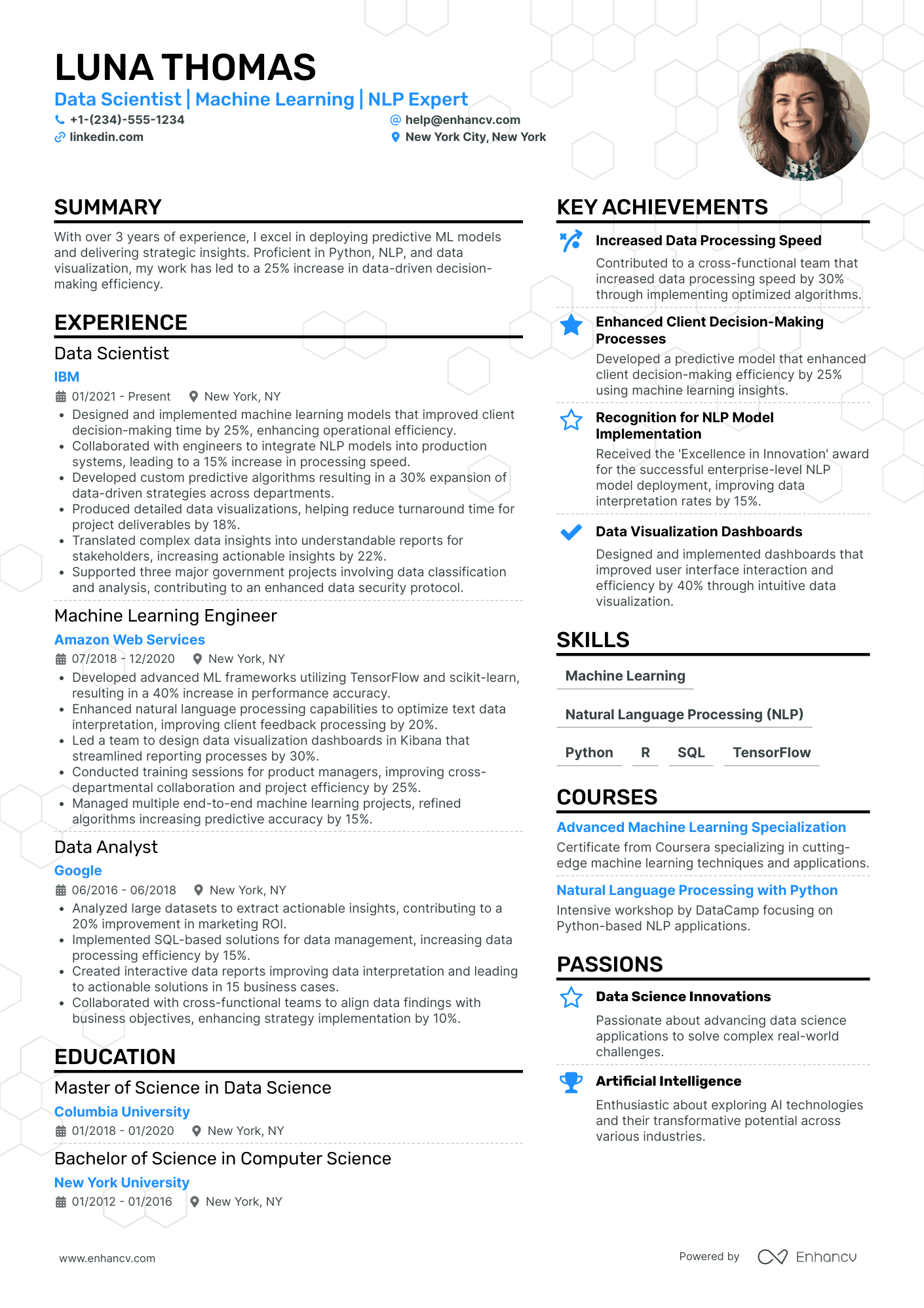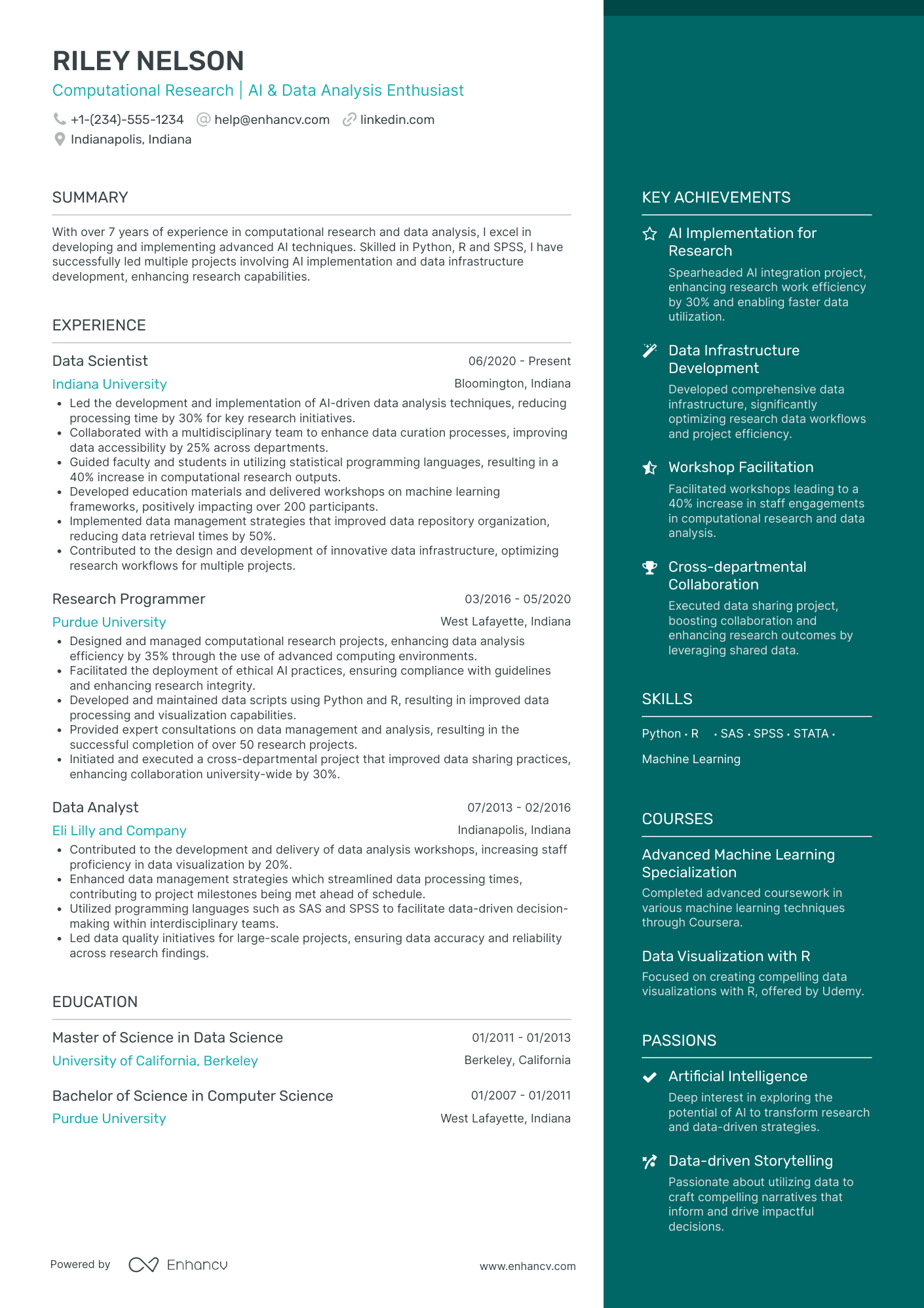Data science is a complex industry, and continues to evolve in today’s technological landscape.
Machine learning and ChatGPT may be booming right now, but it can be challenging to stay on top of these rapidly changing technologies.
Your data scientist resume needs to demonstrate your technical skills as well as your ability to communicate with others. Show the distinct value of each of your projects while avoiding redundancy.
Don’t worry, our guide will show you how to write an incredible data scientist resume that highlights your expertise in Python and SAS without overshadowing your interpersonal skills.
This guide will teach you:
- How to use our data scientist resume templates to make a good impression and attract recruiters’ attention.
- How to format your experience section so that hiring managers can see how you’ll impact success at their company
- How to showcase your skills in a way that shows you’re on top of industry trends and are the right candidate for your target job
- What recruiters look for and how to write a strong data scientist resume summary that gets callbacks
Looking for related resumes?
Data Scientist resume examples
By Experience
By Role
How to format a data scientist resume
There are a few different resume formats to consider for your data scientist resume, but your best bet is to go with a reverse-chronological resume.
The focus of this format is on your work history listed in reverse-chronological order, just as the name suggests.
This is the best choice for senior data scientists who have been in the industry for 10 years or more. It brings attention to your career growth and shows your commitment to your work.
If you’re changing careers or just starting out as an entry-level candidate, a better choice is a functional resume format. This brings attention to your skills and away from your lack of experience.
When choosing a file format for your data scientist resume, always go with PDF. It provides extra security and ensures there won’t be any unwanted formatting changes.
Only use a DOC or another file format if the job application instructions explicitly say so.
As far as data scientist resume length, limit yours to one page. Recruiters don’t want to spend time reading through lengthy resumes, so stick to what’s relevant.
If hiring managers want to see more of your work, your GitHub link is there to guide them.
Adjust your resume layout based on the market – Canadian resumes, for example, may follow a unique format.
Is your resume good enough?
Drop your resume here or choose a file. PDF & DOCX only. Max 2MB file size.
The top sections on a data scientist resume:
- A clear and professional header that includes links to your GitHub portfolio and LinkedIn profile so hiring managers can easily explore your body of work
- An impactful experience section that shows potential employers the success you’ll bring to their company
- A skills section that shows your have the necessary technical skills to get the job done and work well with others
- Certifications and education so recruiters know you meet the job requirements and are dedicated to continuously improving your skills
- A strong data scientist resume resume summary that will grab hiring managers’ attention and get callbacks
What recruiters want to see on your data scientist resume:
- Do you have an educational background in a mathematical subject? What are your qualifications?
- Can you make data-driven decisions? What statistical methods and machinery are you proficient in?
- Do you have the right communication skills to convey information to stakeholders?
- What is your level of expertise in the necessary technical skills and software?
- What results has your work achieved? How will you impact company success?
- Are you up to date on the latest industry trends and practices?
How to create an impactful data scientist experience resume section
The experience section is the core of your data scientist resume. It’s where you’ll let all your hard work shine.
To make the most impact possible, follow these key rules:
- Include only major and relevant positions - the 2-month stint behind the counter at your grandfather’s banana stand interests no one. But that job as a data engineer working on sales data for a national fruit reseller is something the recruiter needs to see!
- Make it reverse-chronological - it’s the resume standard, and it saves mental energy for the recruiter. List your most recent positions first.
- Focus on impact rather than responsibilities - data mining, statistical analysis, and data visualization will be on almost every data scientist’s resume. Instead, explain the impact you had rather than just listing job duties.
Let’s take a look at a data scientist resume experience section to see how to avoid a common mistake.
- •Created and presented models for loan success factors.
- •Did database manipulation of the Financial Aid Database.
- •Coordinated a team of data scientists.
What doesn’t work in this example:
- No quantitative metrics or measurable results
- Uses broad verbs like “did” and “coordinated” that don’t speak to success
- Leaves out industry-specific knowledge or skills
Let’s look at that example again with a few changes.
- •Designed and implemented models for loan success factors, achieving a 20% improvement of approval decision time.
- •Spearheaded complete database restructuring of the Financial Aid Database used across 16 different countries.
- •Coordinated a team of 20 data scientists working on 6 different projects for insurance, finance, marketing, and security departments.
What works in this example:
- Shows evidence of specific results by “achieving a 20% improvement of approval decision time”
- Shows project management skills by mention “team of 20 data scientists working on 6 different projects”
- Shows industry-specific “data restructuring” skills and reach of “16 different countries”
This version is a big improvement. It quantifies impact with measurable results and industry-specific skills.
Always focus on relevant achievements instead of general responsibilities and tailor every section of your resume to fit your target job.
How to quantify impact on your data scientist resume
Companies hire data scientists to provide solutions and maximize success. If you want hiring managers to give you a chance, you need to quantify impact on your resume.
Recruiters will be looking through a stack of resumes that all list “data visualization” and “algorithm development” as skills. It’s not enough just to list it. You need to prove it.
Provide evidence to support your claims by sharing specific achievements with measurable success. Use real data and numbers to quantify impact in every section of your resume.
Quantitative data that can strengthen your data scientist resume include:
- Increased sales revenue
- Reduced redundancy or errors
- Rate of engagement or number of users
- Improved algorithm accuracy
- Profit margin
- Time saved for the company
- ROI for projects
Use these metrics throughout your resume to show potential employers exactly how you’ve achieved succes in previous roles.
Writing an entry-level data science resume
Just because you’re a recent grad looking for your first job in data science, don’t start thinking “I’m done, I don’t have any experience yet!”.
You’re mistaken if you think you don’t have any experience. Consider including
- Course projects that involved data science work - surely you’ve practiced your skills on a few practical exercises you can list here. Just make sure you feature the new and exciting projects - no one wants to see the same tired Titanic Survivor project!
- Internships - no matter if it’s your uncle’s company or a university help gig, you probably learned a lot, including keeping up with deadlines, working well with others, and communicating data results to different audiences. Practical skills matter, even if they’re soft skills.
- Volunteer work or side projects - if you don’t have practical experience, create some. There are tons of local SaaS startups that would benefit from logistic regression analysis to uncover their user activation points - help them out and use that as a practical example in your resume.
As you can see, there is a lot going on beyond traditional 9-to-5 steady job experience. And all of these will look great on your data scientist resume!
Looking to build your own entry-level job resume? Follow the steps in our guide on How To Write Your First Job Resume.
How to list your hard skills and soft skills on your resume
A data scientist needs a unique set of skills that lets you explore, transform, visualize and model datasets, and also communicate constantly with diverse stakeholder groups.
Make a good impression by showing that you have the right combination of hard skills and soft skills to accomplish this.
In “Top 10 Big Data Skills to Get Big Data Jobs” Amit Verma presents a comprehensive list of languages and systems data scientists should be able to work with, including
Top data scientist technical skills
- Programming languages including Python, Java, C, and Scala;
- Quantitative and statistical analysis tools like SAS, SPSS, and R;
- Apache Hadoop and its components like Hive, Pig, HDFS, HBase, and MapReduce;
- NoSQL databases including Couchbase and MongoDB;
- Data visualization tools like QlikView and Tableau;
- Data mining tools like Rapid Miner, Apache Mahout, and KNIME.
Make sure you include only things that you know well enough to start working with tomorrow. There’s no point in inflating expectations and then missing the mark.
What about soft skills?
Just knowing the technology won’t cut it, you need soft skills too. We list some great ones below, and you can check out KDnuggets list of important soft skills.
Data scientist soft skill examples
- Ability to work well with others and on your own
- Critical thinking and problem-solving skills
- Adaptability and capacity to learn new coding languages and programs
- Understanding of general business processes, and related fields, like marketing, HR, cybersecurity, transportation, or customer service.
- Communication skills and ability to explain complex subjects in simple terms
The world of data is complex. Demonstrate that you can navigate through it, but also help others orient themselves in it. Make sure you cover this, especially for more senior positions where presenting to managers is everyday work.
How to list your certifications and education on your resume
You’ve come a long way to becoming a data scientist. You’ve put in a ton of hours reading O’Reilly textbooks, debugging Python scripts, and creating visualizations in Tableau.
Make all your hard work show on your resume. For a stellar education section, add info on
- Your university and major
- Your GPA and final marks
- Key courses relevant to the position you’re applying for
- Any awards you received or societies you were part of
Since data science is a relatively new field, it’s common for professionals to come into it from different fields. If this is the case for you, you can shorten your education section and include additional courses and certifications you’ve earned.
Top 20 data scientist certifications you can take:
- Google Certified Professional Data Engineer (GCP);
- Cornell Data Analytics Certification;
- Certified Analytics Professional (CAP);
- Professional Certificate in Data Science from Harvard University;
- Applied AI with DeepLearning, IBM Watson IoT Data Science Certificate;
- Cloudera Certified Professional: CCP Data Engineer;
- Data Science Council of America (DASCA);
- Dell EMC data scientist Associate (EMCDSA)
- HDP Data Science;
- Microsoft MCSE: Data Management and Analytics;
- Microsoft Certified Azure data scientist Associate;
- SAS Certified Advanced Analytics Professional
- SAS Certified Big Data Professional;
- SAS Certified data scientist;
- IBM Data Science Professional Certificate (Coursera);
- Data Science and Statistics Certification by MIT (edX);
- Machine Learning Certification by Stanford University (Coursera);
- Data Science Certification from John Hopkins (Coursera).
Make sure you follow a few rules when presenting certifications on your resume:
- Make them stand out - don’t bury your certifications in another resume section, give them their own
- Add any capstone projects you worked on - certifications usually make you show what you learned in practice, prove that you can do what you say
- Show them your drive - if you completed the certification course quickly, mention it on your resume. It shows dedication and motivation to learn.
How to write your data scientist resume summary or objective
You may have heard the terms summary and objective used interchangeably when talking about resumes.
To get specific, a summary typically captures your industry experience and a few career highlights in 2-3 sentences. An objective talks about what you want to achieve in the future.
These days they are usually combined into one statement and referred to by either name.
A good formula for your data scientists resume summary is to write 2-3 sentences that cover the following points:
- Your title and role in the industry
- A top career highlight
- A shared goal of you and your potential employer
Let’s look at an example that uses this template.
What works in this example:
- Specific number of years of experience and industry focus
- Shares a measurable result that achieved “94% accuracy”
- States shared goal to “increase engagement with Python modules” with target employer
Optimize your resume summary and objective for ATS
Drop your resume here or choose a file.
PDF & DOCX only. Max 2MB file size.
Additional sections for a data scientist resume
Depending on your experience and career path, there may be additional sections you want to include on your resume.
- Projects - including a section for projects can be key in increasing the value of a data scientist resume. Potential employers want to know how you’ve used your practical skills, and a successful project is a great way to show that.
- Awards - important industry achievements or competitive awards can be a great way to show your value. Include any relevant awards you’ve earned in the field.
- Volunteer work or hobbies - not all practical experience has to come from a job. There are plenty of ways you can develop relevant skills through volunteering or hobbies. Include any experiences that speak to your industry knowledge.
- Publications - a good data scientist is a clear communicator as well as a numbers person. Publications will highlight your ability to clearly communicate complex ideas.
Remember that publications aren’t just research papers published in peer-reviewed journals. This section can also include links to blog posts you’ve written to show that you can speak in more than just an academic tone.
Key takeaways for writing a competitive data scientist resume
To sum it all up, a great data scientist resume should tick these boxes:
- Make a good impression and show your body of work with links to your GitHub portfolio and LinkedIn profile
- Demonstrate practical knowledge and quantify impact with measurable results so hiring managers will know that you can achieve success
- Show how your skills align with the requirements in the job description by tailoring every section of your data scientist resume to your target job
- Include additional sections that show that you stay on top of industry trends and are the right candidate for the job
Now you’re ready to create your amazing data scientist resume and land an interview for your next job!
